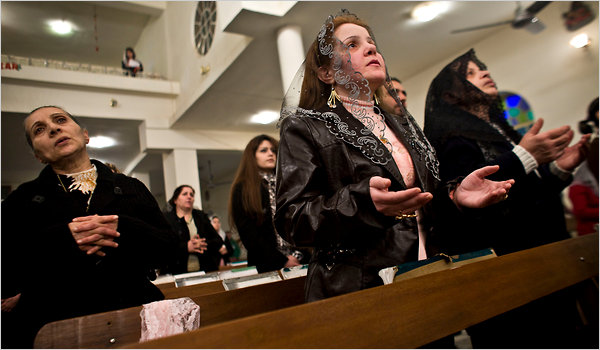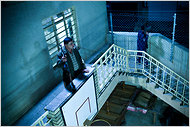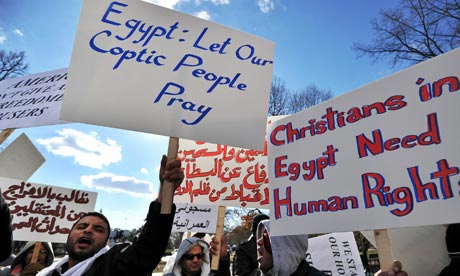Rutashubanyuma
JF-Expert Member
- Sep 24, 2010
- 219,470
- 911,173
Iraqi Christians Exercise Caution for Christmas
 Shiho Fukada for The New York Times
Shiho Fukada for The New York Times
Iraqi Christians attended services in Baghdad on Friday at the Sacred Church of Jesus, a Chaldean Catholic church. Others stayed home, fearing violence.
By JOHN LELAND
Published: December 24, 2010
BAGHDAD - As they gathered to celebrate the birth of Jesus, the congregation here first contemplated death, represented by a spare Christmas tree decked with paper stars, each bearing a photograph of a member of a nearby church killed in a siege by Islamic militants in October.
Related
Enlarge This Image

Shiho Fukada for The New York Times
Security guards were vigilant during the Christmas Eve Mass at the Sacred Church of Jesus, where attendance has dropped by half since October.
The congregants on Friday night were fewer than 100, in a sanctuary built for four or five times as many. But they were determined. This year, even more than in the past, Iraqi's dwindling Christian minority had reasons to stay home for Christmas.
"Yes, we are threatened, but we will not stop praying," the Rev. Meyassr al-Qaspotros told the Christmas Eve crowd at the Sacred Church of Jesus, a Chaldean Catholic church. "We do not want to leave the country because we will leave an empty space."
He added: "Be careful not to hate the ones killing us because they know not what they are doing. God forgive them."
Throughout Iraq, churches canceled or toned down Christmas observances this year, both in response to threats of violence and in honor of the nearly 60 Christians killed in October, when militants stormed a Syrian Catholic church and blew themselves up. Since the massacre, more than 1,000 Christian families have fled Baghdad for the Kurdistan region in northern Iraq, with others going to Jordan or Syria or Turkey. Though the exact size of Iraq's Christian population is unclear, by some estimates it has fallen to about 500,000 from a high of 1.4 million before the American-led invasion of 2003. Iraq's total population is about 30 million.
This week, a new threat appeared on a Web site that said it represented the Islamic State of Iraq, a militant group that claimed responsibility for the October church siege. The Web site referred to a church in Egypt that it said was holding two women because they had converted to Islam, and vowed more carnage. "We swear to God, if there are only two of us left," the text read, "one of the two will keep fighting you."
Churches in Kirkuk, Mosul and Basra canceled or curtailed services for Christmas Eve and Christmas Day, and warned congregations not to hold parties or mount displays. In Baghdad, decorations were seen in stores, but many churches scaled back or held only prayer sessions.
While Our Lady of Salvation, the church attacked in October, was among those that canceled services for Christmas Eve, it planned to hold services on Saturday. The Epiphany Dominican Convent canceled midnight Mass and then early Mass on Christmas morning so worshipers could avoid risky travel at vulnerable times. During the week, the church moved one Mass to a convent, so the nuns would not have to travel in religious dress.
"People are lost," said the Rev. Rami Simon, one of five brothers at the convent. "They don't know where they live now. Is this Iraq?"
For those who dare to attend services, he said: "I say, you must accept to live like the first Christians. They celebrated in a cave, and no one knew about it. So we are not the first to live it."
But he added: "If I wasn't a priest, I would not stay one minute in Iraq. As a priest, I find myself a missionary in my country. And some stay because we are here."
At the Sacred Church of Jesus, attendance has dropped by half since October, Father Qaspotros said. He said he offered this reply to people who tell him they are afraid to come to church: "You are not supposed to be afraid. You are supposed to connect with God, and death is not the last step. If we die, we survive for God."
For Faez Shakur, 25, who attended Father Qaspotros's service on Christmas Eve, this was the message he took away. "Whenever there is disaster," he said, "it means a new day, a new life." When he saw the tree decorated with the faces of the dead, he cried, he said. But he was where he belonged, he said. "We don't have anything else," he said, "just to pray and continue."

Iraqi Christians attended services in Baghdad on Friday at the Sacred Church of Jesus, a Chaldean Catholic church. Others stayed home, fearing violence.
By JOHN LELAND
Published: December 24, 2010
BAGHDAD - As they gathered to celebrate the birth of Jesus, the congregation here first contemplated death, represented by a spare Christmas tree decked with paper stars, each bearing a photograph of a member of a nearby church killed in a siege by Islamic militants in October.
Related
- At War Blog: For Some Iraqi Christians – Shelter in Istanbul (December 24, 2010)
Enlarge This Image

Shiho Fukada for The New York Times
Security guards were vigilant during the Christmas Eve Mass at the Sacred Church of Jesus, where attendance has dropped by half since October.
The congregants on Friday night were fewer than 100, in a sanctuary built for four or five times as many. But they were determined. This year, even more than in the past, Iraqi's dwindling Christian minority had reasons to stay home for Christmas.
"Yes, we are threatened, but we will not stop praying," the Rev. Meyassr al-Qaspotros told the Christmas Eve crowd at the Sacred Church of Jesus, a Chaldean Catholic church. "We do not want to leave the country because we will leave an empty space."
He added: "Be careful not to hate the ones killing us because they know not what they are doing. God forgive them."
Throughout Iraq, churches canceled or toned down Christmas observances this year, both in response to threats of violence and in honor of the nearly 60 Christians killed in October, when militants stormed a Syrian Catholic church and blew themselves up. Since the massacre, more than 1,000 Christian families have fled Baghdad for the Kurdistan region in northern Iraq, with others going to Jordan or Syria or Turkey. Though the exact size of Iraq's Christian population is unclear, by some estimates it has fallen to about 500,000 from a high of 1.4 million before the American-led invasion of 2003. Iraq's total population is about 30 million.
This week, a new threat appeared on a Web site that said it represented the Islamic State of Iraq, a militant group that claimed responsibility for the October church siege. The Web site referred to a church in Egypt that it said was holding two women because they had converted to Islam, and vowed more carnage. "We swear to God, if there are only two of us left," the text read, "one of the two will keep fighting you."
Churches in Kirkuk, Mosul and Basra canceled or curtailed services for Christmas Eve and Christmas Day, and warned congregations not to hold parties or mount displays. In Baghdad, decorations were seen in stores, but many churches scaled back or held only prayer sessions.
While Our Lady of Salvation, the church attacked in October, was among those that canceled services for Christmas Eve, it planned to hold services on Saturday. The Epiphany Dominican Convent canceled midnight Mass and then early Mass on Christmas morning so worshipers could avoid risky travel at vulnerable times. During the week, the church moved one Mass to a convent, so the nuns would not have to travel in religious dress.
"People are lost," said the Rev. Rami Simon, one of five brothers at the convent. "They don't know where they live now. Is this Iraq?"
For those who dare to attend services, he said: "I say, you must accept to live like the first Christians. They celebrated in a cave, and no one knew about it. So we are not the first to live it."
But he added: "If I wasn't a priest, I would not stay one minute in Iraq. As a priest, I find myself a missionary in my country. And some stay because we are here."
At the Sacred Church of Jesus, attendance has dropped by half since October, Father Qaspotros said. He said he offered this reply to people who tell him they are afraid to come to church: "You are not supposed to be afraid. You are supposed to connect with God, and death is not the last step. If we die, we survive for God."
For Faez Shakur, 25, who attended Father Qaspotros's service on Christmas Eve, this was the message he took away. "Whenever there is disaster," he said, "it means a new day, a new life." When he saw the tree decorated with the faces of the dead, he cried, he said. But he was where he belonged, he said. "We don't have anything else," he said, "just to pray and continue."

